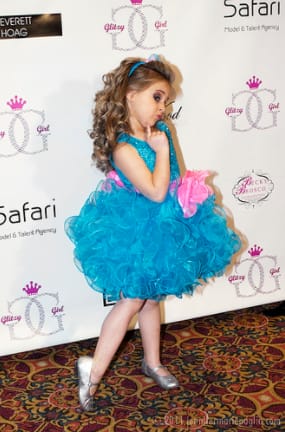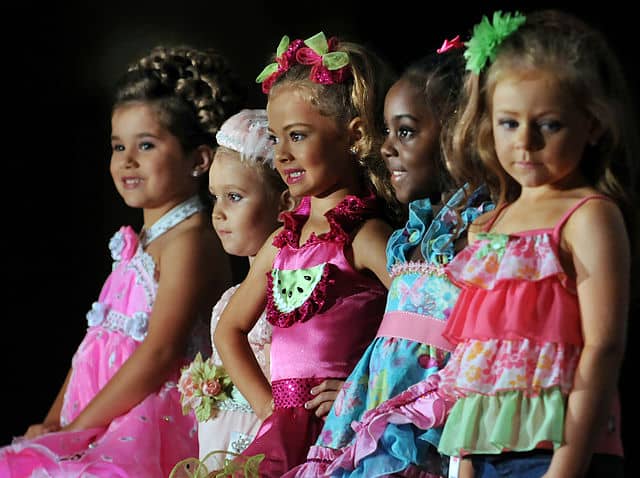[dropcap]J[/dropcap]onBenet Ramsey was a very successful pageant girl who was found murdered on December 26th, 1996. This little beauty pageant girl had a great history in the beauty pageant world, winning several awards according to CNN, ranging from Little Miss Colorado, Americas Royale Miss, National Tiny Miss Beauty, and several others. Unsurprisingly, the media is automatically more drawn to the victims that will look good in the news. TV and news sources are getting more chances to plaster photos of her in her years of being a pageant princess, according to an article from Oregon Live. It is obvious that people are more drawn to the case of JonBenet then to the case of other “less photogenic victims.” This almost makes it sound like the news really does not care about the story or the other facts behind it, but since JonBenet was a star, she is put in the news and papers countless amounts of times. The first thing that many others think of when hearing JonBenet’s name is that she was a child beauty pageant star. When other younger girls see JonBenet’s beautiful, dolled up face, they’ll want to be just like her. They won’t even realize what had heartbreakingly happened to this young girl. This beauty pageant star faced a terrible tragedy, and many other girls have faced problems because of these competitions.
Child beauty pageants are one of the biggest things that can impact a young child’s life. The amount of long-term effects from these pageants are huge. The psychological marks these can leave on children can theoretically be reduced if these child pageants were just non-existent.
Body Dissatisfaction
Throughout their life, these pageant participants experience many different disorders and impacts because of their child years. One of the biggest impacts is body dissatisfaction, or anorexia nervosa. An article by Felicia Byrnes explains how previous winners of pageants are continuing to “diet to the point of harming themselves.” This contributes to disorders such as anorexia and other types of dissatisfaction in girls. [perfectpullquote align=”left” cite=”” link=”” color=”” class=”” size=””]Basically, young girls are being taught that to win you need to be thin.[/perfectpullquote] An article by Sana Hassan describes how girls competing in these competitions feel the need to “achieve perfection and attractiveness” to succeed. How are these young girls supposed to feel good about themselves when they are being thrown into events where they are judged on their appearance?
Sadly, many sources show that a majority of these girls number one wishes in life is to be thinner. The way that some adult pageants are run is not helping the bounce off effect it has on their younger viewers, by showing that the winners in these older pageants are way too thin, that it is most likely unhealthy.
Basically, young girls are being taught that to win, you need to be thin.

BY Jennifer Marie Puglia from Flickr
It’s sad to believe, but even these girls mothers can be a major factor into these types of disorders. The Pennlive Editorial Board explains a case in Toddlers and Tiaras where a mother forces her daughter to quit gymnastics because “her arms were getting too muscular to fit into the sleeves of her pageant dress.” At an early age, this young girl learns that since she is becoming too muscular, she has to stop doing that activity so she can still be slim to fit into her pageant dress.
This is teaching her that her body is “wrong” and that she needs to fix it.
One of the biggest joys of being a child is the freedom that you have, not having to worry about the outside world. How are they able to savor this freedom when they are being told to stop doing something they love, so they can succeed in something they don’t necessarily want to take part in?
Early-Sexualizing
This one is no surprise. Girls aged to be under 16 years are experiencing early sexualization all the time in pageants and shows such as TLC’s Toddlers and Tiaras. This is a big cause of lowering someone’s self esteem in the long run, making them feel the need to always wear these kinds of outfits and loads of makeup to fit in with their peers. [perfectpullquote align=”full” cite=”” link=”” color=”” class=”” size=””] These pageants are taking the idea of an innocent game of dress-up and turning them into full-fledged beauty competitions. [/perfectpullquote] This sexualization is forcing them to grow up and conform to something that is not supposed to be natural to them.
When these pageant girls grow up, they will still have it built into their mind that you need a certain type of look to win.
The long term effects are very prominent in these competitors. The American Psychological Association wrote a report describing what early sexualization really is and how it affects young girls. They provide long term and short term studies and sum it up by saying “sexualization and objectification undermine confidence in and comfort with one’s own body, leading to a host of negative emotional consequences, such as shame, anxiety, and even self-disgust.” Later in life they experience all of the negative things these shows have to offer.
Children as young as 3 are being put into these revealing outfits. An author from the PennLive Editorial Board describes a beauty pageant mother “dressing up her daughter as a prostitute from ‘Pretty Woman’.” This teaches this child and many others that it is normal to behave and dress up this way, because their own MOTHERS are putting them in these clothes.
An example of these other kinds of practices is described in a report by the American Psychological Association. They explain how in these competitions, “5 year old girls are encouraged to wear fake teeth, hair extensions and makeup and are encouraged to ‘flirt’ onstage by batting their long, false eyelashes.”
Children should not have to be worried about what they are wearing, because honestly, it should not matter even a bit at this age. (Yet, it shouldn’t matter at any age, but that’s a whole different story.)
When a child learns something from a parent or guardian, it most definitely sticks with them. The adults in these girls lives should be able to serve as role models. Sadly, for many of these girls, it’s not happening that way. The amount of wrong things said to these young girls by their own parents is just sad to think about. A mother-daughter relationship by NO means should involve these types of things. Children should not be exposed to this type of stuff at such an early age, or their behavior will forever be changed. These pageants are taking the idea of an innocent game of dress-up and turning them into full-fledged beauty competitions.
Opposing Views
In her article, Andrea K. Clark explains her views on the pros of child beauty pageants. A point brought up is that these pageants “are a great vehicle for toddlers to start building self-confidence.” [perfectpullquote align=”right” bordertop=”false” cite=”” link=”” color=”” class=”” size=””]Parents struggle to differentiate between their own needs and their child’s needs.[/perfectpullquote] This doesn’t really make a whole ton of sense. It does not seem possible for a lot of girls to gain self-confidence from these competitions which force them to be something that they are not. Sure, if a young girl wins one of these competitions, she’ll be happy about it. Though, the kind of confidence you earn basically teaches them that they won because of the way they acted and looked during the contest. We can’t forget what she’s gone through to be on top.
Self-confidence should be about their positive views on themselves and who they actually are, not the version they are forced to be for the cameras.
Another viewpoint about the pros from these competitions is brought up by The Global Issues Blog, which provides a list of positives. There is a claim that beauty pageants provide the competitors with a sense of family support and being able to value it. They are said to feel normally “more secure about the unwavering support from their family regardless of the outcome.” This just can’t be said about every competitor. Alexis Blue from The University of Arizona wrote an article about Martina Cartwrights view on beauty pageants, one point specifically being that parents of these girls do not treat them the best. Cartwright had been able to view two LIVE viewings of the show Toddlers and Tiaras, and be able to experience firsthand how the girls are treated off and on camera. She describes how parents forced “high pressure on their young daughters to look flawless, and [to] win at all costs.” This does not represent the “unwavering support” from their parents. Cartwright also explains what she calls “achievement by proxy distortion [which] occurs when parents struggle to differentiate between their own needs and their child’s needs.”
If the girl’s parents aren’t able to think of their own children’s other then their own, they are not proving to show this support. If they supposedly don’t care about the outcome, then what sense does pushing them to succeed in the shows make?
Conclusion
In the long run, I don’t know how long these child beauty pageants are going to continue. Many efforts are being made to have these competitions banned, but not every try has been successful. If these pageants keep up, it will be a large contribution to the number of girls around the world that are not happy with their outer appearances, even if their inner beauty shines. At age 5, girls should not even begin to think about if they will be accepted from the outside.
This may sound cliche, but it’s true.
What’s on the inside is the most important thing that you should keep watch on.
Featured image by Lloyd Gallman from Flickr





What do you think?
Show comments / Leave a comment